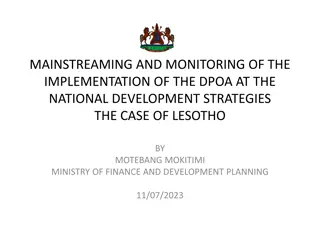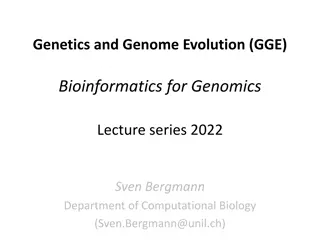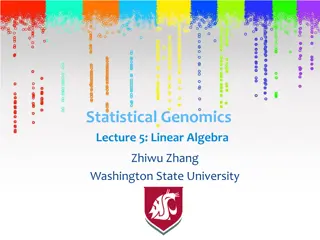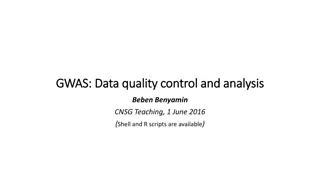Genomics Update: Mainstreaming Genetic Testing Criteria
Matilda Bradford, GMSA Lead Genetic Counselor for Cancer, provides insights on mainstreaming genetic testing criteria for rare and inherited diseases. Explore resources, quick access referrals, and further training support in genomics.
Download Presentation

Please find below an Image/Link to download the presentation.
The content on the website is provided AS IS for your information and personal use only. It may not be sold, licensed, or shared on other websites without obtaining consent from the author.If you encounter any issues during the download, it is possible that the publisher has removed the file from their server.
You are allowed to download the files provided on this website for personal or commercial use, subject to the condition that they are used lawfully. All files are the property of their respective owners.
The content on the website is provided AS IS for your information and personal use only. It may not be sold, licensed, or shared on other websites without obtaining consent from the author.
E N D
Presentation Transcript
LONG CLEAR VIEW By Hannah and Jenessa
Plot Long Clear View presents us with the story of Vic Lang, the new kid in town, son of a cop. Vic arrives in town knowing no one, and at first feels invisible . He feels as though he is missing a piece to the puzzle. Vic is treated with suspicion within the town, perhaps as a result of being the son of a policeman, or possibly just because he is new in town. This secrecy may suggest that these people are hiding something, or may just highlight Vic s already obvious paranoia.
Plot Vic looks up to his father as a role model, and clearly values their relationship very highly. However, his father s job (a policeman) means that Vic doesn t get to spend much time with him, and we find that Vic feels alone when he cannot be with his father. Vic develops this obsession with his father s rifle, that is hidden in Vic s parents room. He takes it out, not to shoot, but to feel the smoothness of it. It calms him and helps him when he feels alone.
Plot As time progresses Vic gets used to his life in the town. However he has not made many new friends and often feels isolated and alone. Then things start to change. The school is lit on fire, and people start talking to Vic, asking him about the fire, and what he knows, because his dad is on the police force. We see people using Vic for information, trying to pry things out of him, things that he doesn t know.
Plot It is unclear as to whether these things are just happening now, or whether Vic is only just noticing them. Vic develops an obsession, for trouble. This could be as a result of his father s job, that he sees so much death, crime and suffering. This suggests that the trouble that is occurring is somehow Vic s fault, through his anticipation for the troublesome events. Vic blames himself for forgetting to keep watch, or even just for fitting in.
Plot Then Suddenly, Vic s father has been transferred, to a temporary posting a hundred miles away . Before his father leaves he says to Vic I just need you to be responsible. Vic takes this to heart, and starts taking care of everything. He takes care of his sister and mother, and of the house, and is a good boy , and still his father doesn t come home.
Plot We see that Vic is working to bring his father home, and he believes that it is his responsibility to protect his mother, sister and home. When his mother goes out, Vic keeps a lookout from his parents bedroom. From there he has a long, clear view and sees all the lies that are occurring around him. Winton writes responsibility is on you now, formless and implacable as gravity (Page 198) as if Vic is finally accepting that he must not give up, and cannot stop until everyone is safe.
Plot (summed up) Long Clear View' tackles Vic's mixed feelings and blurred vision (physiological confusion?) as his father is driven away from home by unlawful police colleagues. Vic is left to look after the household, and experiences the pain of being left to fend for himself, his mother, and sister, and the fact of an absent father.
Loner Find its hard to revel his feeling Strong relationship with his father until he leaves Vic People assume that he has the answers because of his Dad s job Guns Calm him Becomes the Man of the house when his dad leaves Works hard to bring his dad home Falls in love with an older girl
Vics Dad (Bob) His Job forces him to move away from his family Workaholic Loves his family, but doesn't t spend much time with them In the Police force
Language The story is written in second person singular which allows audiences to view things from Vics point of view, and makes the story more directed and personal, as well as helping us to understand Vic s feelings and actions. There is no direct dialogue, and this also gives us a more one-sided view of events, and makes us feel almost disconnected from the rest of Vic s world, while being connected to Vic through his experiences that we as the readers share.
Language There s no days off for the old man, no fun, no respite, no weekends away or drives out to farms to ping tins off tree stumps. (Page .) The use of short sentences to describe violence, crimes and suffering makes them abrupt and almost as if they are being reported, rather than experienced by Vic.
Themes This story addresses the issue of crime and violence in everyday life, and how it is overlooked as just something that happens, rather than something to be stopped. For example Vic kicks his dog because he is so distraught about his dad being posted away. This shows how much Vic loves his father, that the dog that he loves so much means less to him than being with his father.
Themes Family- Vic looking after his sister and mum. Vic loves his father so much that it becomes his identity Belonging- Vic strives to belong in the community but once he does he doesn t want to be a part of the community Masculinity - Vic feels empowered when his father puts him in charge of looking after his family . Isolation- Vic feels isolated when he moves into a new town, knowing no one.
Symbols The Gun The gun is a symbol of power and violence. Vic is fascinated by his dads rifle Symbolising his desire for dominance. The gun in also a way for him to be connected with his father.
Male VS Female It is evident that the males are more dominant than females. This can be highlighted when Vic is put in charge of his household when his father gets a job posting. Hence, proving that even through his mother is older and wiser than Vic, because of her gender (female) she lacks dominance and control to look after her children. responsibility is on you now, formless and implacable as gravity (Page 198)























